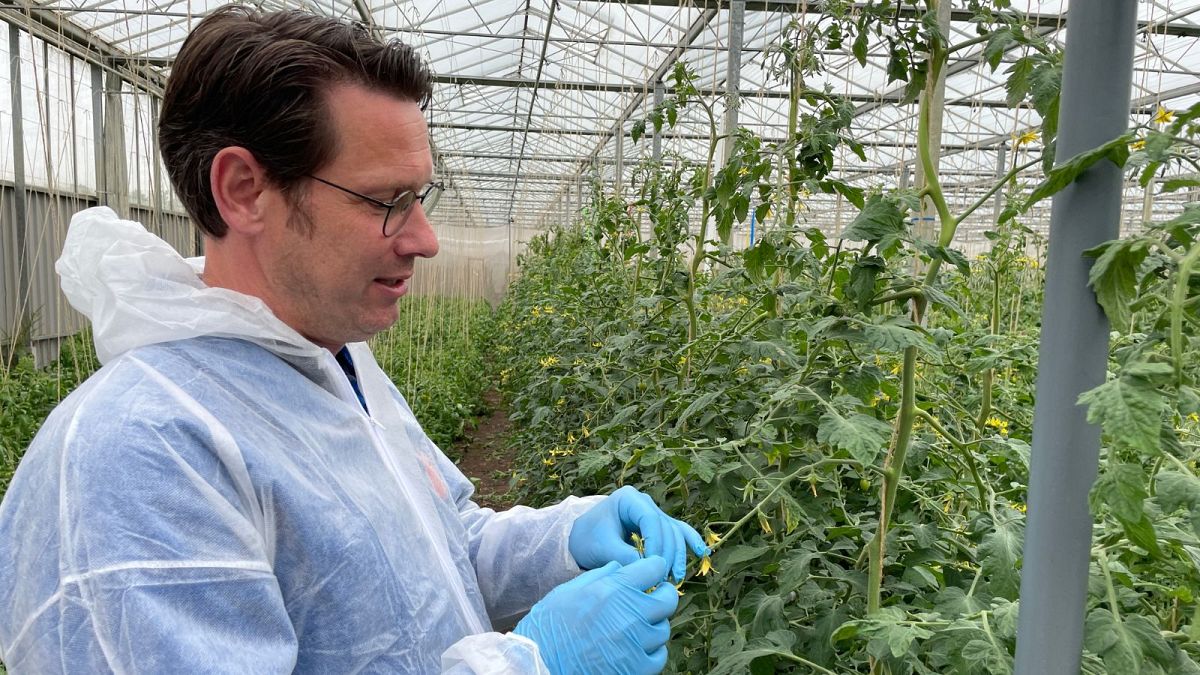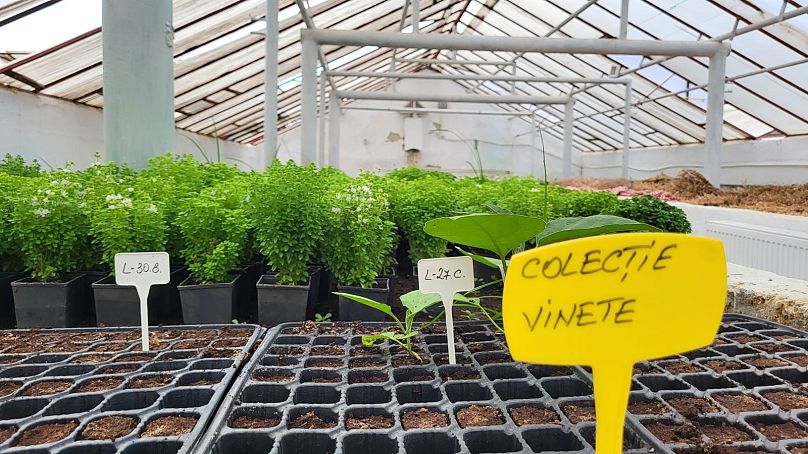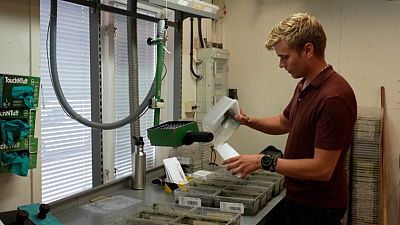A silent battle is brewing over the control of our food supply's very foundation: seeds.
Europe has one of the most diverse seed industries in the world. In Germany, the Netherlands and France alone, hundreds of small breeders are creating new varieties of cereals, vegetables and legumes.
Relying on decades of careful selection to improve desired traits like yield, disease resistance and flavour, they adapt seeds to local environments through methods like cross-breeding.
This legion of plant breeders help maintain Europe’s biodiversity and ensure that our food supplies stay plentiful. But their work is under growing threat from the patent industry.
Although it’s illegal to patent plants in the EU, those created through technological means are classified as a technical innovation and so can be patented.
This means that small-scale breeders can no longer freely plant these seeds or use them for research purposes without paying licensing fees.
Around 1,200 seed varieties that can be naturally bred are affected by patents across Europe, as agrochemical companies claim to create them through technical innovations.
The little-known European Patent Office (EPO) grants those patents - an entity fully independent from Brussels and funded by corporate patent fees, whose decisions EU member states abide by.
European plant breeders are having to ‘fight against patents’
Frans Carree, an organic breeder at Dutch company De Bolster, is trying to develop a tomato resistant to the brown rugose fruit virus, which can destroy entire harvests. But his efforts are being hindered by more than a dozen patent applications on this resistance from multinationals like BASF, Bayer and Syngenta.
Although the patents have not been granted yet, they create legal uncertainty and a real risk that his investment would not pay off.
In order to develop his own virus-resistant tomato, Carree would need to read all patent applications to understand which traits the companies have filed a patent application for. The patent applications are written in such complicated language, however, that he sometimes struggles to understand them.
He would then need to ask a laboratory to sequence all of his plants to make sure that the patented trait is not included in his varieties - a time and cost intensive task.
“It takes so much work to fight against patents, I do that besides my job. I’m a breeder, I like to be with my plants,” says Carree.
What are New Genomic Techniques and can NGT seeds be patented?
In recent years, the development of new editing techniques known as New Genomic Techniques (NGTs) have enabled scientists to get even more surgical with editing seeds’ genetics.
NGTs allow specialists to improve specific genes’ existing functions or add new ones without affecting other parts of the genome. Advocates of NGTs see great potential in it: fewer pesticides and fertilisers, disease and drought resistant plants, even cereal fields irrigated by the sea are conceivable.
Currently, all plants derived from NGTs are as strictly regulated as genetically modified organisms (GMOs) - which are created by inserting genes from one organism to another.
But given their potential, agrochemical companies and scientists have been pushing the EU to deregulate NGTs. In February this year, the European Parliament voted to deregulate NGTs on the market, even allowing some of them to be considered the equivalent of conventionally-bred plants.
The number of patents on seeds could increase with the potential deregulation of NGTs at the EU level, a study by the European Commission suggests.
Michael Kock, former Head of Intellectual Property at Syngenta, predicts a future where “the majority of new varieties entering the market will be affected by patents”. To address concerns over increased costs and new dependencies for farmers and breeders, the Parliament has also proposed a ban patents on NGTs.
A final decision on NGTs is not expected any time soon. The Parliament is now in negotiations with member states, many of whom, including Austria, France and Hungary, oppose genetic engineering in agriculture in general.
However, even if EU heads of member states eventually agree on a patent ban, it might prove ineffective. Martin Häusling, the German Green MEP co-responsible for the NGT rules, warns that such a ban would be “worth nothing”.
That's because the EPO has the actual say on what can and cannot be patented across Europe - and it doesn't follow EU law.
What is the European Patent Office and why does it matter?
The EPO's reach extends beyond the 27 EU member states, encompassing 39 member countries, including the United Kingdom, Türkiye and Switzerland.
Instead of each EU member country individually examining patent applications, the EPO - a self-described ‘public service organisation’ - manages the approval of European patents through a centralised process.
The implications of this patent regime are far-reaching. With concentrated corporate control over seeds comes reduced genetic diversity, as small- and medium-sized breeders have less genetic material to work with. This could lead to less resistance during climate disasters and food supply disruptions.
As Europe weighs market-focused growth against environmental and food security, the increasing number of seed patents poses an existential threat to the continent's fields.
Key loopholes in seed patenting
This story could have ended in 2017. For years, small breeders, farmers’ groups and environmental organisations sounded the alarm that more and more biological material is being privatised through patents.
As a response, in 2017 the European Commission issued an interpretative notice on its 1998 Biotech Directive, stating that “products obtained by essentially biological processes” cannot be patented.
The EPO followed the Commission’s interpretation and banned patents on conventionally-bred plants, a decision welcomed by breeders and farmers.
But they soon realised that critical loopholes remained. The EPO's Administrative Council did not clearly distinguish between naturally occurring gene variants and random mutations on one side, and technical interventions generated by genetic engineering on the other side.
This allows companies to use NGT tools to apply for patents on conventionally-bred plants, warns the coalition No Patents on Seeds.
“If granted, the patent holders can control access to plants, regardless of whether genetic engineering is used or not,” warns Christoph Then, the spokesperson for No Patents on Seeds.
There is already a troubling precedent. In 2022, the EPO granted a patent to German company KWS for maize with improved digestibility (which enables consumers to absorb more nutrients). According to the patent description, the gene variants were originally found in maize plants from conventional breeding.
This decision allows KWS to control the productionof plants with these genes, whether they result from random mutations or genetic engineering, potentially preventing other breeders from using them. It was the first patent granted for an application filed after 2017.
Examiners at the EPO evaluate each patent application and check whether an invention is truly technical, new and inventive and thus patentable.
The EPO declined to comment on how they ensure that technical methods aren't used to re-invent traits found in nature. A spokesperson of KWS said that “for legal reasons” they cannot comment on individual patents and that they “are in dialogue with No Patents on Seeds”.
A prohibitive environment for Europe’s plant breeders
Since the 2017 changes to the patent law, each claim needs to explicitly state that the patent doesn't cover plants produced by biological means. On the flip side, this seemingly protective measure has also created a significant burden for breeders.
If a breeder develops a plant with similar resistance to a patented variety, the onus falls on them to prove they didn't infringe the patent.
Sjoerd Hoekstra, a former director of a biotech department at the European Patent Office (EPO) with 33 years of experience, explains: “The breeder needs to show that a certain trait was naturally selected. Then his plant is not affected by the patent. One problem is that legal action could be taken anytime. This can be difficult for small breeders.”
Unlike multinationals, small and mid-sized breeders cannot afford to pay patent lawyers. A lawsuit could mean financial ruin.
Is the European Patent Office granting too many patents?
The EPO has come under fire from small breeders, environmental organisations, politicians and even from the industry.
Critics say that the EPO is incentivised to grant patents, as its staggering €2.5 billion budget is derived entirely from user fees from filing to examination. This raises concerns about potential conflicts of interest.
“From the beginning, this was a problematic institution, which was running, so to say, its own business with its own clients,” says Then, “despite the fact that primarily patent law was meant to benefit society as a whole, not only specific groups.”
Even agrochemical companies criticise the EPO for handing out patents like candy - in less candid words.
Syngenta’s Head of IP Crop Protection, Filip De Corte, said in aninterview with the EPO that “patent quality” was an issue. “We do not ask the Patent Office to grant us patents, we ask the Patent Office to examine and actually refuse the patents that are not meeting the patentability requirements,” he said.
The reason for that? “If we spend so much money - we invest about $1.5 billion (€1.4 bn) each year in discovering and developing new products - we want to be able to rely on that when the European Patent Office tells us, yes you have a valid patent,” he said, adding that Syngenta needs “enforceable patents”.
De Corte even had a message to the EPO examiners: “Be sceptical and be critical.”
This investigation was developed with the support of:


















